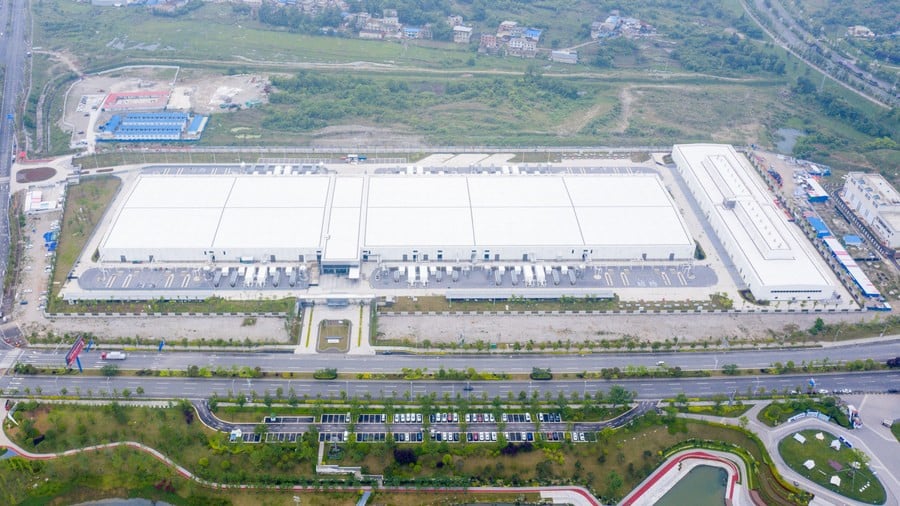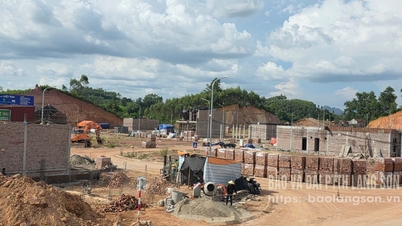Unique ecological advantage
“Big Data Valley” is the Chinese name for the mountainous Guizhou province in the southwest of the country, where more than 5,000 limestone caves and vast underground cave systems are unknown, the result of geological changes in the area over hundreds of millions of years.
In parallel with promoting the wilderness experience tourism of the caves, Guizhou has taken advantage of this prehistoric space to develop a digital economy focused on big data, with Big Tech server centers and data exchange markets.
China's Ministry of Information and Communications says Guizhou is the best location to build data centers in the south of the country. The province's limestone caves, which have hampered its economic development, make it the perfect environment for big data infrastructure.

Terry Gou, chairman of Hon Hai Precision Industry, which also operates Foxconn – the world’s largest contract electronics assembler – said that Guizhou’s “unrivaled ecological advantages” were the reason the company chose to locate its data center there. The tech giant built a wind tunnel between two mountains to naturally cool its servers.
Located in the inland southwest of China, Guizhou has a favorable cool climate all year round, providing natural “air conditioning rooms” for its massive heat-generating data centers.
Not only that, this province is rich in hydropower, ready to provide clean and stable energy for servers. Guizhou is also far from earthquake belts, so the data "reservoir" is more secure.
Cave data centers can save up to 58% on electricity compared to similar facilities in the southeastern region of the country.
Jiao Delu, chief engineer of the provincial big-data development administration, said that if calculated based on 10,000 standard server units, a data center can cut 130 million yuan (about 18.57 million USD) in electricity bills annually.
Tencent, one of the tech companies that has set up a server center in Guizhou, said its facility was inspired by mountain caves, making effective use of cold air from the outside while minimizing negative impacts on the internal environment.
According to an on-site inspection conducted by the Ministry of Industry and Information Technology of China, the peak power usage effectiveness (PUE) of the data center located here is about 1.1 (the closer to 1, the more efficient), compared with the average PUE of other centers in China of 1.73.

The province currently has 37 data centers in operation or under construction serving tech giants such as Apple, Huawei and Tencent, as well as the “Hua Tianyan” telescope scientific research project. Among them, Guiyang City, a provincial capital, is the country’s first comprehensive national big data pilot zone.
Changing the economic face of the highlands
Guizhou is promoting the big-data industry as the backbone of its digital economy, which is expected to contribute 37% of the province's GDP by 2022.
This is also the leading locality in China in terms of digital economy, with the highest growth rate on the mainland for seven consecutive years.
Since 2014, the mountainous province has fostered many innovations and breakthrough developments in the data industry. According to a report by the China State Information Center, Guizhou scored the highest in big-data development in 2017.
In 2018, the government launched a large-scale initiative calling on more than 10,000 businesses to use big data technology to improve networks and services within five years, an estimated market worth $120 billion. From less than 1,000 big-data businesses, the number in the province has now increased to more than 12,000.
Guizhou is home to the national big data engineering laboratory and China's first big-data market, gathering the world's super-large data centers.
The local government estimates that by 2023, the total output value of the electronics and information sector supported by big-data will exceed 350 billion yuan, contributing to a digital economy that accounts for 50% of the province's GDP.
Data centers handle the reception, storage and transmission of data streams, becoming one of the most important information infrastructures in the digital economy, said Luo Dan, a researcher at the China Academy of Information and Communications Technology.

“Building the giant, energy-intensive center inside the caves is of great significance in realizing the carbon neutrality goal in parallel with the Digital China plan that has been launched,” Luo asserted.
Not only that, the rise of data centers has led to the development of high-speed broadband internet networks, helping the locality achieve an annual e-commerce growth rate of 30%, higher than the average growth rate of agricultural enterprises in China.
Currently, all three major Chinese carriers, as well as Apple, Huawei, Tencent and Foxconn, have decided to build their core data centers in Guizhou.
Local authorities here have built platforms using big-data technology to solve specific problems in specific areas. For example, the poverty reduction platform connects provincial and city departments, visually displays detailed information on the number of poor households, shares information in real time between administrative departments, or simplifies administrative procedures through big-data cloud applications.
It can be said that data has become the "secret" to the change and development of Guizhou province, which is being compared to Northern California before it became Silicon Valley today.
(According to CNN, news.cn)
Source



![[Photo] Keep your warehouse safe in all situations](https://vphoto.vietnam.vn/thumb/1200x675/vietnam/resource/IMAGE/2025/10/1/3eb4eceafe68497989865e7faa4e4d0e)


































![[Photo] President of the Cuban National Assembly visits President Ho Chi Minh's Mausoleum](https://vphoto.vietnam.vn/thumb/1200x675/vietnam/resource/IMAGE/2025/10/1/39f1142310fc4dae9e3de4fcc9ac2ed0)


























































Comment (0)